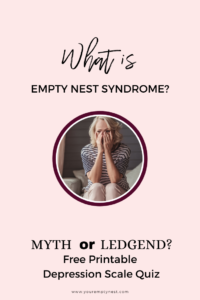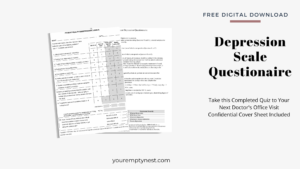You may ask, what is empty nest syndrome? Is it different than the expected feelings when a grown child moves out? Empty nest syndrome is a condition where a parent or parents has symptoms of depression due to the flying of their grown child from the home/nest.

A Syndrome is a term generally assigned to a set of symptoms.
Webster Dictionary explains that “The syndrome word is defined as a group of signs and symptoms that occur together and characterize a particular abnormality or condition.” The Mayo Clinic reminds us that, “Empty nest syndrome isn’t a clinical diagnosis. Instead, Empty Nest Syndrome is a phenomenon in which parents experience feelings of sadness and loss when the last child leaves home”. You can read more of their article Here

When a young adult leaves for college or get married or even just moves out, it is normal to miss them now that they are gone. However, parents of grown children who have taken this departure especially hard and have it affect their daily activities of living is looked on as Empty Nest Syndrome.
The feelings of emptiness, sorrow, longing and tearfulness are in fact, very real. Empty Nest Syndrome has Symptoms of Depression. For some parents the experience can be devastating. These feelings often result in what is commonly called, “Empty Nest Syndrome”. Let’s look into this further.
The 4 characteristics that best describe “Empty Nest Syndrome” are:
- Expressions of Extreme Sadness.
- Feelings of Loss and Longing
- Sense of Loss of Purpose
- Fearfulness for Their Children

Who is affected by Empty Nest Syndrome?
The median age of Empty Nesters is 50.9 years old. In some cultures the average age is closer to 55. Six out of ten families will experience an Empty Nest at some point in their lives. The condition is most common among women, yet men and women can experience Empty Nest Syndrome. No one is immune to it.

Let us not forget that many newly formed Empty Nesters are able to bounce back rather quickly and are enjoying their new found freedom, yet others are devastated.
When should an Empty Nester seek professional help?

If the nester is taking the loss especially hard, they should be watching out for signs of Clinical Depression.
- These symptoms include:
- 1.eating or sleeping too much or not enough,
- 2.decline in self care,
- 3. excessive thoughts of hopelessness and uselessness &
- 4. fearfulness for their grown children
Some of these people are experiencing feelings of illness. This may result in being late to work or even missing work altogether. If someone is presenting with these changes for more than 2 weeks, they should seek medical help. A trip to their primary care physician can be their first stop. Referrals can be made if necessary.
If you or someone you know are experiencing feelings and ideas of suicide, please call the National Suicide Prevention Hotline. 800-273-8255 Help is available, speak with someone today.
Text HOME to 741741 any time 24/Day
I do not pretend to be a mental health professional. My medical opinion is based on my nursing training and my Licensed Practical Nurse license in the state of Washington, USA. I am also an Empty Nester.
What can someone do to get through the challenges of Empty Nest Syndrome?

- 1. Have patience with yourself.
- 2. Give yourself time to grieve.
- 3. Keep in touch with your fledgling.
- 4. If at all possible, go to their activities, tour their facilities, and help decorate their dorm.
- 5. Weekly calls or more, if possible, will help you feel connected to your child.
- 6. Invite them to come home whenever it is appropriate, and remember, an invitation is not a mandate.
- 7. Keep in mind that these changes are as different for them as they are for you.
- 8. Exercise self care, pamper yourself, even get a new haircut if you like.

In conclusion, empty nest syndrome is a condition where a parent or parents has symptoms of depression due to the flying of their grown child from the home/nest.
Some people need medical help to overcome these feelings. Relationships will change when children become adults and lives will change. Many empty nesters even have marriage problems. Recovering from the feelings of loss will take time, but it will lessen over time. Seek medical help if depressive symptoms last 2 weeks or more.
This is a time for growth for both parents and grown children. Let’s make it a time of adventure.

I was able to get a copy of the Depression Scale Quiz that is used in standard doctor’s offices. If you would like to download a copy, take the quiz, and take it to your next office visit, click below.
Recent Comments